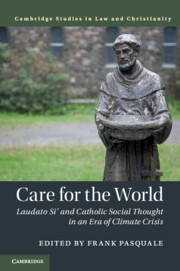Book contents
- Care for the World
- Law and Christianity
- Care for the World
- Copyright page
- Contents
- Contributors
- Acknowledgments
- Introduction
- Part I Policy Implications of Laudato Si’
- Part II The Philosophy and Methodology of Laudato Si’
- Part III Catholic Social Thought at Work and Play
- 8 “Truly, Much Can Be Done!”: Cooperative Economics from the Book of Acts to Pope Francis
- 9 Toward an Ethic of “Civic and Political Love” in the Workplace
- 10 Laudato Si’ and Augmented Reality: In Search of an “Integral Ecology” for the Digital Age
9 - Toward an Ethic of “Civic and Political Love” in the Workplace
from Part III - Catholic Social Thought at Work and Play
Published online by Cambridge University Press: 31 May 2019
- Care for the World
- Law and Christianity
- Care for the World
- Copyright page
- Contents
- Contributors
- Acknowledgments
- Introduction
- Part I Policy Implications of Laudato Si’
- Part II The Philosophy and Methodology of Laudato Si’
- Part III Catholic Social Thought at Work and Play
- 8 “Truly, Much Can Be Done!”: Cooperative Economics from the Book of Acts to Pope Francis
- 9 Toward an Ethic of “Civic and Political Love” in the Workplace
- 10 Laudato Si’ and Augmented Reality: In Search of an “Integral Ecology” for the Digital Age
Summary
- Type
- Chapter
- Information
- Care for the WorldLaudato Si' and Catholic Social Thought in an Era of Climate Crisis, pp. 167 - 182Publisher: Cambridge University PressPrint publication year: 2019



